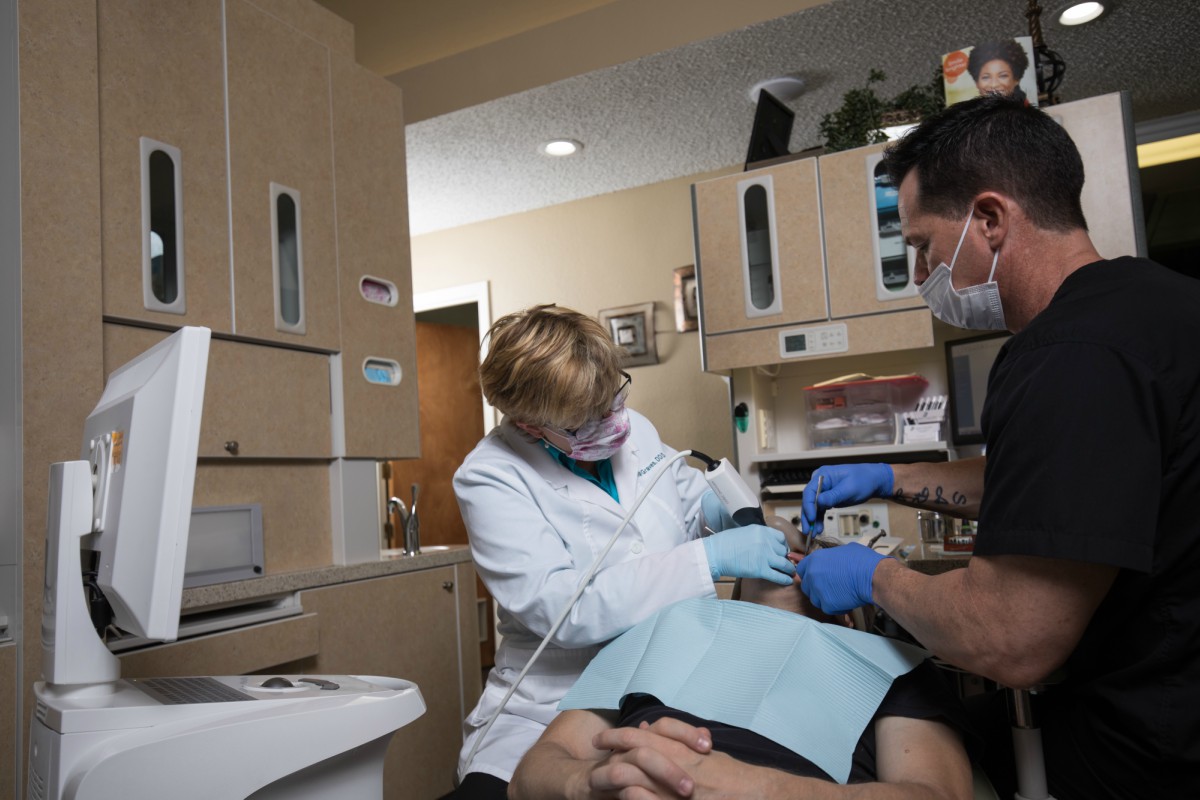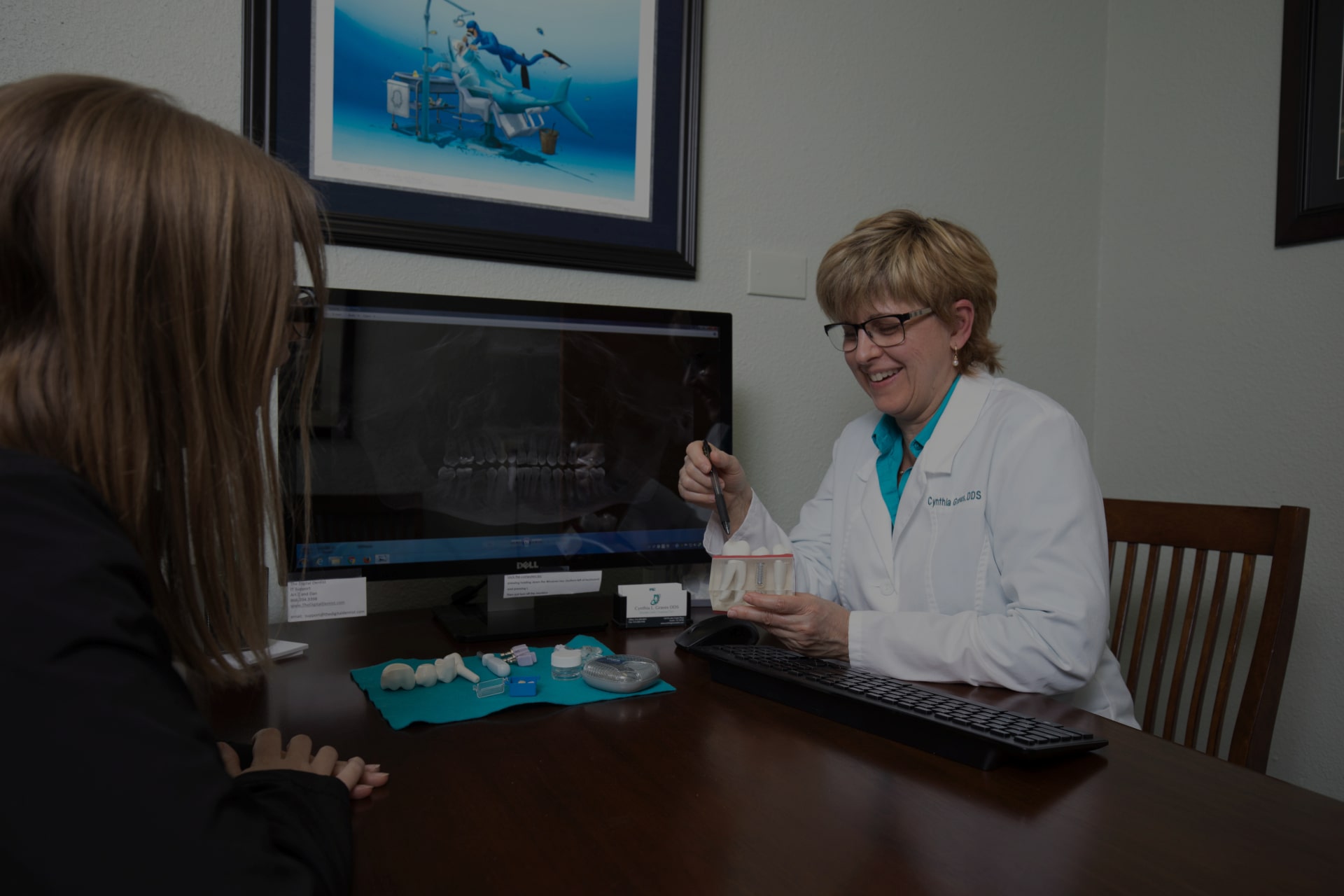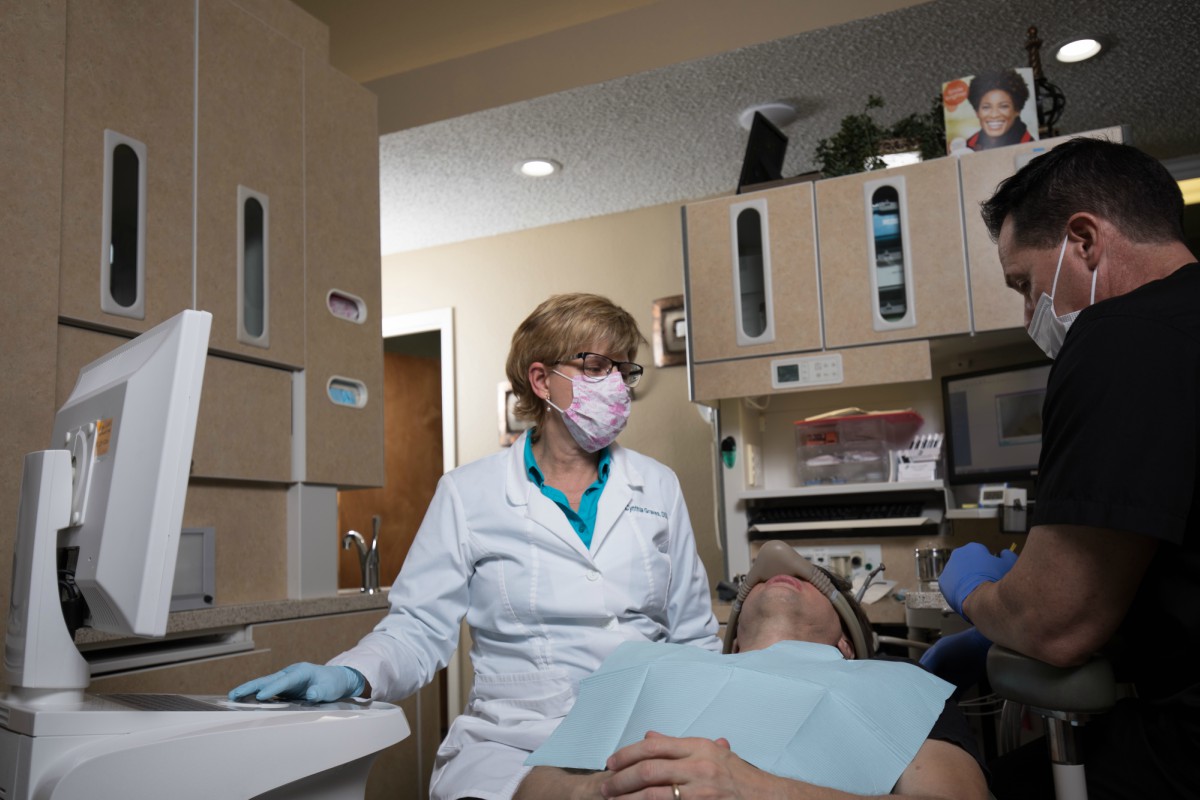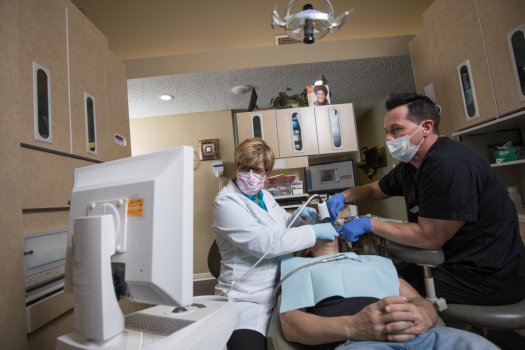
Which Dental Crown is Best For Your Tooth?
A dental crown is a restorative dental procedure in which a tooth-shaped cap is placed over a damaged or decayed tooth in order to improve its appearance and/or function. Crowns can be made from a variety of materials, such as ceramic, porcelain, metal, or composite resin, and are often used in conjunction with other dental treatments, such as bridgework or implants. In addition to restoring teeth that have been damaged by injury or decay, crowns can also be used to improve the appearance of misshapen or discolored teeth. The process of placing a dental crown typically takes place over two visits to the dentist. During the first visit, the tooth is prepared for the crown and an impression is taken. This impression is then used to create the custom-made crown, which is placed on the tooth during the second visit. With single visit, dental crowns can last for many years. Please make sure to ask your dentist whether they provide Single Visit Crowns in Austin or not.
When it comes to dental crowns, there are a few different options available. The best type of crown for your tooth will depend on a number of factors, including the location and function of the tooth, as well as your personal preferences.
Here is a look at some of the most popular types of dental crowns:
Gold Crowns: Gold crowns have been used for many years and are still a popular option today. They are strong and durable, making them ideal for molars or other teeth that experience a lot of wear and tear. Gold crowns are also less likely to chip or break than other types of crowns. However, they are more expensive than other options and can be more difficult to match to the natural color of your teeth.
Porcelain Crowns: Porcelain crowns are very popular because they look very natural. They are also strong and durable, making them a good option for molars or other teeth that experience a lot of wear and tear. However, porcelain crowns can be more expensive than other options and may not be as strong as gold crowns.
Stainless Steel Crowns: Stainless steel crowns are a good option for molars or other teeth that experience a lot of wear and tear. They are strong and durable, making them ideal for these types of teeth. Stainless steel crowns can be more difficult to match to the natural color of your teeth and may not be as strong as gold or porcelain crowns.
Ceramic Crowns: Ceramic crowns are a good option for front teeth or other teeth that do not experience a lot of wear and tear. They are made to match the natural color of your teeth and are less likely to chip or break than other types of crowns. However, they may not be as strong as gold or porcelain crowns.
E-Max Crowns: E-Max crowns are made of a strong ceramic material and are ideal for molars or other teeth that experience a lot of wear and tear. They are less likely to chip or break than other types of crowns. However, they may be more expensive than other options.
Conclusion
Your teeth can fit well in single visit, look natural, and feel comfortable. There are many different types of dental crowns available, so it’s important to consult with your dentist to find the best option for you. Talk to your dentist about which type of dental crown is right for you. You can also ask whether Single Visit Crowns in Austin option available with your dentist.
Read More
What Happens When a Typical Dental Examination is Carried Out?
Our Austin TX Denture Clinic will examine your teeth and gums, looking for any signs of decay or disease. They will also check your bite to make sure that your teeth are aligned correctly. If necessary, they may take X-rays to get a better look at your teeth and jawbone. Once the examination is complete, the dentist will clean your teeth and may also give you a fluoride treatment to help prevent tooth decay.
Below are some points to expect during a dental check-up.
- The dentist will take a look at your teeth and gums to check for any problems.
A trip to the dentist usually starts with a thorough examination of your teeth and gums. The dentist will look for any signs of tooth decay, gum disease, or other problems. They will also check to see if there are any loose or missing teeth. In addition, the dentist will examine your tongue, throat, and lymph nodes for any signs of infection. After the examination, the dentist will clean your teeth and give you a report on their findings. If they find any problems, they will recommend treatment options. Otherwise, they will simply give you some tips on how to maintain good oral health.
- They will then clean your teeth, removing any plaque or tartar buildup.
They will then clean your teeth, removing any plaque or tartar buildup. They may also floss your teeth and perform a professional cleaning, which polishes your teeth and removes any surface stains. In addition, they may take X-rays to check for tooth decay or other problems. After the cleaning, they will likely apply a fluoride treatment, which helps to ward off tooth decay.
3. If you have cavities, the dentist will fill them with a special material.
If you have cavities, the dentist will fill them with a special material. This material is called a “filling” and it helps to restore the tooth to its original shape. There are different types of fillings that can be used, depending on the size and location of the cavity. The most common type of filling is made from a metal called amalgam. An Amalgam is a mixture of mercury, silver, tin, and copper. It is strong and durable, making it ideal for cavities that are hard to reach. However, some people are concerned about the mercury content in amalgam fillings. As a result, dentists also offer composite fillings made from plastic and glass. Composite fillings are not as strong as amalgam fillings, but they are less visible and less likely to cause sensitivity. The type of filling that is right for you will depend on your individual situation. Your dentist can help you choose the best option for your needs.
Conclusion
A dental check-up is an important part of keeping your teeth healthy. It’s a good idea to schedule one every six months to make sure you don’t have any cavities or other dental problems. Our Austin TX Denture Clinic will also help you with tooth implant and crown problems and will also polish your teeth if necessary. Dental check-ups are an important part of oral health care, so be sure to schedule yours today!
Read More
Tips to Take Care of Your Teeth
Taking care of your teeth with a Dental Clinic Austin 78750 will help you prevent cavities and gum disease. It also helps you keep your natural teeth for as long as possible.
Here are some tips for taking care of your teeth:
- At least twice a day, brush your teeth.
Maintaining good oral hygiene is essential for keeping your teeth and gums healthy. Brushing your teeth at least twice a day helps to remove plaque and bacteria from your mouth, reducing the risk of cavities and gum disease. In addition, flossing daily helps to remove food particles and plaque from between your teeth, preventing the buildup of tartar. Regular brushing and flossing can also help to freshen your breath and prevent bad breath. While brushing and flossing are important, they are only part of maintaining good oral hygiene.
- Floss at least once a day to remove plaque and bacteria from between your teeth.
Plaque is a sticky film of food debris, bacteria, and saliva. If plaque is not removed, it can harden and turn into tartar (calculus). Not only is tartar unsightly, but it also irritates gums and contributes to gum disease. Flossing removes plaque from between teeth and beneath the gumline, which a toothbrush cannot reach. In addition to removing plaque, flossing also helps to remove bacteria that can cause bad breath. For best results, floss once a day, preferably at night. Gently insert the floss between your teeth and use a back-and-forth motion to remove plaque. Be sure to floss under the gumline as well. Rinse your mouth with water or mouthwash after flossing.
- Rinse with an antibacterial mouthwash to help reduce plaque and bacteria.
Most people are aware that plaque and bacteria can lead to cavities and gum disease, but they may not realise that these same culprits can also cause bad breath. While brushing and flossing help to remove plaque and bacteria from teeth, rinsing with an antibacterial mouthwash can also be effective in reducing their levels. Mouthwashes work by killing bacteria or by inhibiting their growth, and this can help to freshen breath and reduce the risk of oral health problems. When choosing an antibacterial mouthwash, be sure to look for one that is ADA-approved. This designation indicates that the mouthwash has been tested for safety and effectiveness. Rinse with an antibacterial mouthwash once or twice a day for fresh breath and peace of mind.
- Regularly visit your dentist for professional cleanings and checkups.
A Dentist in 78750 can help you maintain good oral health. During a professional cleaning, your dentist will remove plaque and tartar from your teeth, a process that helps to prevent tooth decay and gum disease. Your dentist will also check for signs of oral cancer and other problems. In addition, regular dental visits provide an opportunity to ask questions about your oral health and get professional advice on how to improve your at-home care routine. Whether you have questions about flossing techniques or are considering whitening treatments, your dentist can provide you with the information you need to make informed decisions about your oral health. As a result, regular dental visits are an important part of maintaining good oral health.
By following these simple tips, you can keep your teeth healthy and sparkling for years to come!
Conclusion
Taking care of your teeth is important, and there are many ways to do it. Regular brushing and flossing, along with visits to the Dental Clinic in Austin 78750 every six months, will help ensure that your smile stays healthy for years to come.
Read More
What Are The Important Qualities That Dentist Should Have?
Dentists must be able to put their patients at ease and build trust with them. Dental clinic Austin explain the procedures and answer questions in a way that patients can understand. They also need to be able to handle patients who are nervous or in pain. In addition, dentists must be able to work well with other members of the dental team, such as dental hygienists and dental assistants. Good interpersonal skills are essential for dentists who want to provide the best possible care for their patients.
Here are three skills a Dentist must have:
- Dentists need to have excellent manual dexterity. This quality allows them to perform delicate procedures.
Dentists need to have excellent manual dexterity in order to perform delicate procedures, such as removing decay from teeth or placing fillings, with great precision. This quality is essential in order to provide high-quality dental care. Without it, dentists would not be able to carry out many of the procedures that are essential for maintaining oral health. Manual dexterity is also important for carrying out restorative work, such as building up chipped teeth or fitting crowns. Good manual dexterity is essential for any dentist who wants to provide the best possible care for their patients.
- They also need to have good visual acuity and depth perception. These qualities enable dentists to detect problems in a patient’s mouth and to work precisely in small spaces.
These qualities enable them to identify cavities, cracks, and other abnormalities. In addition, they need to be able to see clearly in order to select the proper dental instruments and materials. Dentists also need good hand-eye coordination to perform delicate procedures such as placing fillings and extracting teeth. Without these skills, dentists would not be able to provide high-quality care for their patients.
- Finally, dentists must have good interpersonal skills.
One of the most important qualities of a successful dentist is strong interpersonal skills. In such a personal profession, it is crucial that dentists be able to establish trust and rapport with their patients. Strong communication skills are also essential, as dentists must be able to explain complex dental procedures in simple terms that patients can understand. By developing strong relationships with their patients, dentists can build a successful practice. Our dentist office in Austin TX is warm and friendly, who takes the time to listen to their patients and answer their questions. Contact us today!
Conclusion
Dentist in 78750 Austin Texas help their patients achieve and maintain good oral health. However, in order to do this, they need three important qualities: compassion, technical skill, and business acumen. These qualities will allow dentists to provide the best possible care for their patients while also running a successful business. We hope that this article has helped you understand what it takes to be a great dentist and given you some insights into the dental profession.
Read More
How Would You Identify A Good Dental Clinic?
There are a few key factors that you should look for when trying to identify a good dental clinic. The first is the accreditation of the clinic. This means that the clinic has been vetted by an independent body and found to meet certain standards. The second is the experience of the staff. You want to make sure that the dentist and other staff members have plenty of experience in providing quality dental care. Finally, you should look at the clinic’s reputation. Talk to friends and family members who have been to the clinic before, and read online reviews. If the clinic has a good reputation, then you can be confident that you will receive quality care.
Below are some of the points that you should consider while finding a good dental clinic:
QUALITY OF SERVICES:
The prime thing that you should consider while finding a good dental clinic in Austin is the quality of services they offer. A good clinic will have a team of qualified and experienced dentists who can offer you the best possible treatment. Furthermore, the clinic should use the latest technology and equipment to provide high-quality services.
TECHNOLOGY AND EQUIPMENT:
As mentioned above, a good clinic will use the latest technology and equipment. This ensures that your treatment is carried out in the best possible manner. In addition, the use of latest technology also allows the clinic to offer you a range of services that were not previously available.
PRICING:
While quality of services is important, you should also consider the pricing of the clinic. There are many clinics which offer excellent services at an affordable price. Compare the prices of different clinics and choose the one which fits your budget.
LOCATION:
The location of the clinic is also an important factor to consider. You should choose a clinic which is easily accessible and located in a safe area.
TREATMENTS OFFERED:
When choosing a clinic, you should make sure that it offers the treatments that you are looking for. A good clinic will offer a range of dental treatments such as teeth whitening, veneers, crowns, cosmetic dentistry, bridges, and implants.
Sterilization process:
You should also check if the clinic follows a proper sterilization process. This is important to ensure that you do not contract any infections. Sterilization method keep the instruments and surgical areas safe and clean away from infections for every patient they treat.
These are some of the key factors that you should look for when trying to identify a good dental clinic in Austin. By considering these factors, you can be confident that you will receive quality care from a reputable clinic.
Conclusion
By taking the time to ask questions and compare clinics, you can be sure that you are making the best decision for your family’s oral health. We hope that this article has helped you understand what to look for in a dental clinic and given you some ideas about how to find the right one for your needs. If you leave in Austin or Texas then choose Dr. Cynthia L. Graves even other dentists choose for themselves then why don’t you? If have any additional questions, please don’t hesitate to contact Dr. Graves or visit dental clinic in Austin.
Read More
Scared Of The Dentist? We Offer Nitrous Sedation!
Dental anxiety is nothing to be embarrassed about. In fact, it has been estimated that at least 15% of all Americans suffer from some kind of dental anxiety, and many people miss regular teeth cleaning and other dental operations due to a fear of the dentist.
At the office of Cynthia Graves, DDS in Austin, we cater to folks who need sedation dentistry. Dr. Graves is a compassionate dentist with years of experience and offers nitrous oxide to all patients, free of charge!
Whether you’re nervous about a simple teeth cleaning, or a more complex procedure like a CEREC crown, Dr. Graves is here to help.
Nitrous Oxide – The Best Choice For Minor Cases Of Dental Anxiety
Nitrous is the most commonly administered form of sedation dentistry. It is also known as “laughing gas.” This harmless gas is used both for adults and children. It can help combat negative feelings, such as anxiety and helplessness, that are common among those who suffer from dental anxiety.
Nitrous oxide is usually administered through a mask that fits over your nose. This nasal mask allows the doctor to work on your smile without disrupting the flow of sedation. The effects of nitrous are easily reversed, so Dr. Graves can quickly bring you back to an alert state.
The reason that nitrous oxide is so commonly used is that it has no significant side-effects. While oral sedation and IV sedation leave patients groggy and unable to drive themselves home after their appointments, nitrous oxide can be used on any patient. Patients will feel alert before they leave the dentist’s office.
If you have a fear of the dentist, or you’re nervous about an upcoming procedure, nitrous from Dr. Graves in Austin may be right for you. Dr. Graves is an experienced dentist in Anderson Mill, and you can trust her to give you kind and compassionate treatment.
Get The Treatment You Need – Without The Fear!
Laughing gas is usually enough for most anxious patients. However, if you have a more severe case of dental anxiety, we can discuss other options such as oral sedation. Oral sedation may be appropriate as it affects consciousness more significantly. You may be drowsy at the office, forget the procedure, or even fall asleep while receiving treatment.
Regardless of how severe your dental anxiety may be, we can help. And because we offer nitrous for free to every patient, there’s no reason for you to skip your appointment due to fear of the dentist.
Contact Dr. Graves Now To Get Started!
Whether you’re in Anderson Mill, Westlake or anywhere else in Austin, Dr. Graves is here to help. With our sedation options, you’ll be safe and comfortable during treatment. Read our patient testimonials to learn more, and contact us for an appointment today. Call (512)-258-8001, or visit our office at 10418 Lake Creek Pkwy, Austin, TX 78750.
Read More
Can Acid Reflux Damage My Teeth?
After studying the effects of acid reflux on teeth in a “Worn Dentition” course, Dr. Graves is confident that a well-trained family dentist is often better able to detect the warning signs of acid reflux before your regular physician.
Do I Have Acid Reflux?
You’re the picture of health: you eat plenty of nutritious foods, move your body and, of course, brush your teeth morning and night. You even floss (side note from me: keep it up!). And you’ve got a mouth full of straight, white teeth—the kind of smile that truly lights up a room—to show for it. The last thing that’s on your mind is visiting the dentist.
Checkup Today, Smile Tomorrow
You know the saying, “An ounce of prevention is worth a pound of cure.”
Did you know that your six-month checkups (a.k.a., preventative dentistry) are about much more than just getting your teeth cleaned? During your appointment, your family dentist examines your teeth and gums for the early signs of tooth decay, erosion, periodontal problems, and even risks of oral cancer.
When you visit the dentist on a regular basis, we can help you identify and treat minor issues—the ones that are hard to notice—before they turn into problems that require more extensive (and expensive) dental work.
Oral Health for Overall Health
The state of your mouth gives your dentist clues about your overall health, too. For example, we’re often able to diagnose the early stages of a common digestive disorder called gastroesophageal acid reflux disease (GERD).
GERD causes frequent heartburn and leads to increased acidity in the mouth. At your checkup, your dentist will look for oral signs of GERD, including weakened enamel, tooth erosion and other early indicators of tooth decay.
Some of the most frequent symptoms of GERD include:
- Heartburn or chest pain
- Sinus infections
- Bad breath
- Hoarseness or sore throat
- Dry cough
- Difficulty swallowing or the sensation of a lump in the throat
Caught early, you can protect your tooth enamel from exposure to excess acid and prevent the rapid deterioration that GERD can cause—shielding yourself from a mouth full of cavities!
Protect Your Teeth From Acid
If you suspect you might be suffering from GERD, talk to your physician and your dentist. Your healthcare providers will help you identify strategies that will alleviate symptoms and resolve the uncomfortable side effects of extra acid in your mouth and throat.
Your doctor might prescribe medications or changes in lifestyle to help you minimize your discomfort. You can experiment with your diet, too—maybe certain foods are a trigger for you? Often times, acidic foods like tomato, citrus, coffee, alcohol and hot spices will aggravate GERD. Sometimes, smaller, more frequent meals will help.
Your dentist may suggest dental sealants to help strengthen your tooth enamel, to stop deterioration before it has a chance to turn into cavities.
Preventative Dentistry in Austin, TX
At Cynthia L. Graves, DDS, we welcome all patients in the Austin, Round Rock, Pflugerville, Cedar Park, Leander, Georgetown, Wimberly and surrounding areas to our office! Our goal is simple: early detection and treatment of minor dental issues using state-of-the art equipment and gentle methods. We want you to experience the comfort of good oral health—for life!
Call us today at (512) 258-8001 to book your next checkup and experience the friendly, patient-centered care that we offer in our Austin, TX facility. Here’s to your continued health … and a great smile.
Read More